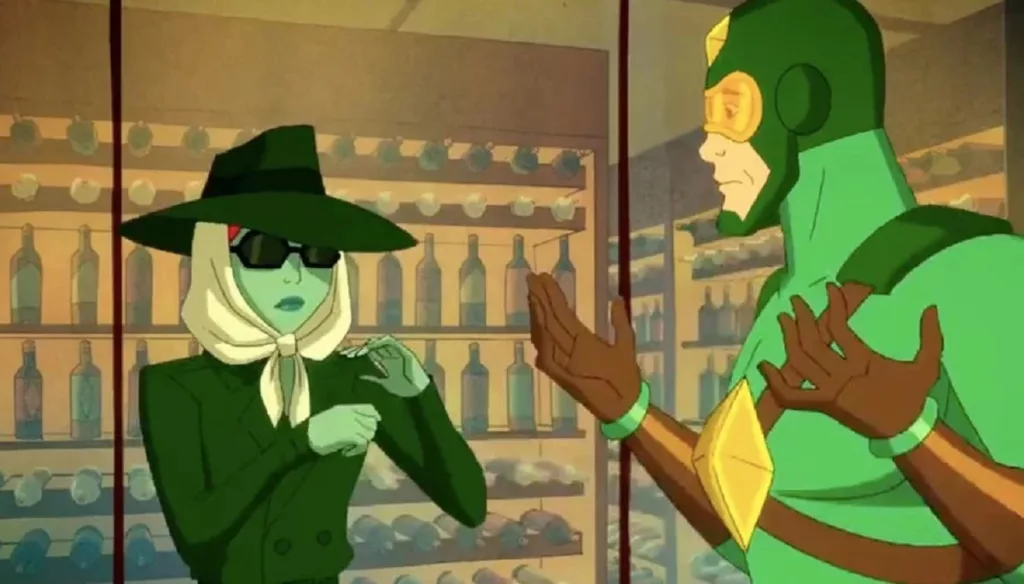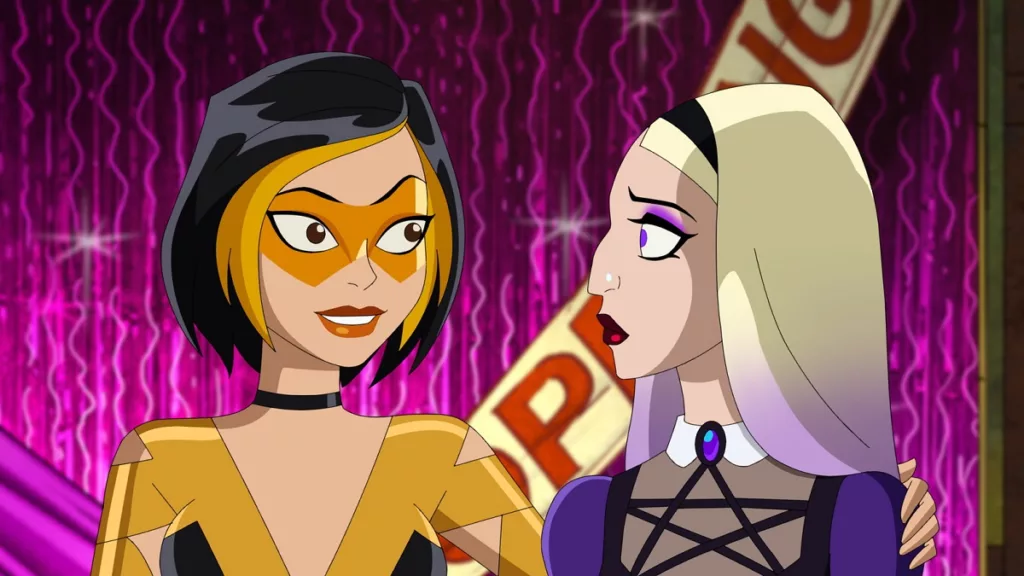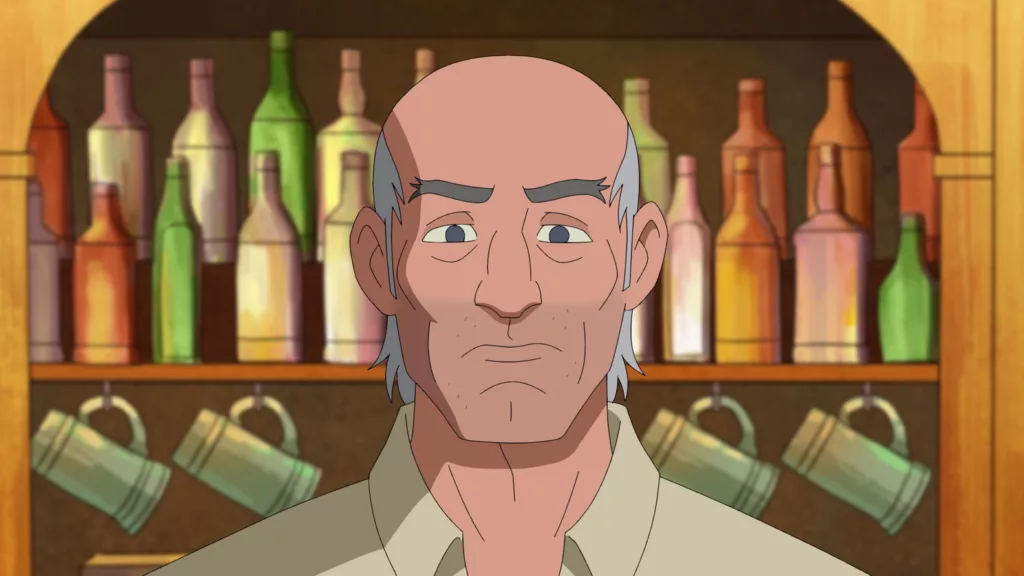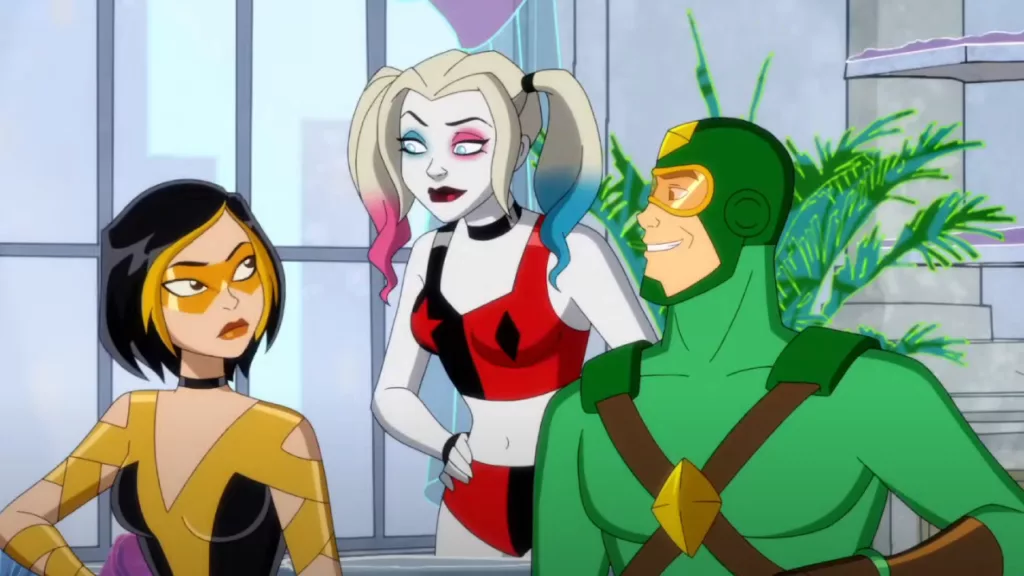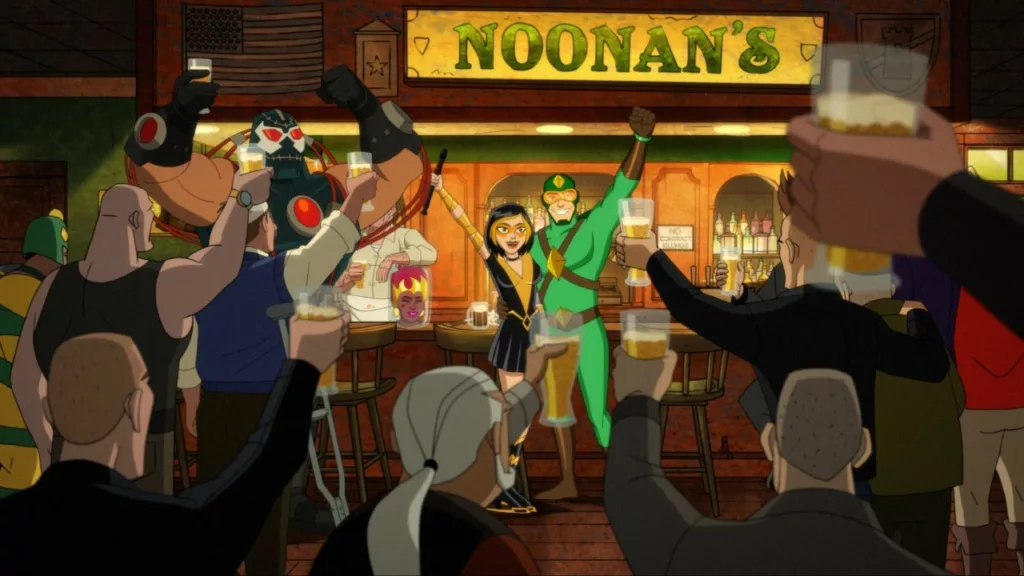Chuck Brown, better known as Kite Man, has never been one of DC’s headliners. In the comic books, hedwells in the shadows of Batman’s rogues gallery, his green suit and skyward scheme earning little more than eyerolls. Things looked up when the animated series Harley Quinn featured him in a funny arc as Poison Ivy’s reluctant beau. But could Kite Man finally take flight as his own show’s lead?
Spinning off from Harley Quinn’s satirical success, Kite Man: Hell Yeah! centers on Chuck and his gal pal Golden Glider running Noonan’s, a dive bar frequented by Gotham’s fallen foes. Sounds like setup for situational hijinks galore amongst the henchmen and baddies. Yet where Harley Quinn excels at peeling back layers on its beloved characters, this show struggles to flesh out its own.
By episode’s end, Chuck remains as one-note as ever—his only “power” is an aw-shucks kindness. Golden Glider, Bane, and the rest blend into an indistinct crowd of thinly drawn types—jokes that should take off either crash or linger long after their welcome. With so much talent involved, it’s a letdown, but this sequel doesn’t soar higher.
Harley Quinn offers a reminder that supervillain satire can succeed wildly if there’s heart and thought behind the humor. Kite Man deserved better than serving mostly as a pale imitation. With a little tweaking of the script, this misfit meritocrat of a character still might find his way to the big leagues. For now, he’ll stay grounded.
Characters: An Unfulfilled Cast
Take lead guy Kite Man. Seems like a nice enough but forgettable sort in his comic cameos. Harley Quinn gave him a boost yet left him undefined—we knew he pined for Poison Ivy—yet what really drove him? Kite Man: Hell Yeah! promised to shine a light, but ultimately tells us little new. He shrugs through plots as the nominal straight man, wanting badly to prove himself but lacking any viable methods or motivations. By the finale, Chuck Brown remains a blank slate.
The Golden Glider brings slightly more intrigue. Her ice-cold killer instinct clashes with a newfound maternal bond that running the bar demands. Yet even Stephanie doesn’t get raw material worthy of her acting chops. We see tantalizing hints of depth left unexplored—addiction, codependency, a shadowed past. As for Malice, Bane, and lesser regulars? They’re background caricatures of moving lips, bereft of dimensionality. Sets them up for short shelf lives once jokes wear stale.
Supporting casts fare even worse. Gus exists solely to drive contrived plot points. The alcoholic brute Sixpack boils down to “Drunk men say dumb things.” Dubelz and Fables fail to build beyond bickering and reused gags. Their roles may as well be placeholders for real fleshed-out individuals to someday inhabit and truly populate this world. As is, they feel more set dressing than participants in any fully realized narrative.
In the end, Harley Quinn triumphs due to how it invests in rounding out even-bit players into feeling like real people. Kite Man, hell nah. It never elevates its cast beyond gimmicks, leaving viewers as removed from caring about their fates as their supposed peers within seem to be. No wonder its heart fails to take flight—these characters remain as two-dimensional as a kite.
Shortflight from Success
Harley Quinn took everyone by surprise. With its gleeful R-rating escapades and richly nuanced leads, the series understood what made these characters sing. It saw potential in supposedly “minor” players and fleshed them out with resonance. Audiences felt invested in Harley’s self-discovery as much as her hijinks.
Kite Man had more to prove, coming from far humbler origins. While Harley already enthralled multiple audiences, this guy was basically just “Hellyeah” Guy. Developers were tasked with building intrigue from the ground up, but it never quite took off. We learn he pines for acceptance, yet it remains a sad punchline. Beyond dad’s issues, there’s little anchoring us to his plight.
Without an anchor, the show floats away on a tide of in-jokes. Rather than standing on its own comedy merits, it rests on referencing previous DC works. Cameos feel obligatory rather than organic. While fun for mega fans, this insider mindset limits resonance with new viewers. Kite Man never sparks his own meme-worthy moments, indicative of truly catching fire.
Harley Quinn soared by investing in multi-dimensional leads we felt invested in. But Kite Man remains more of a kite snagged in Harley’s wake, tugged around without strong steerage of its own. With better character architecture and fewer winks to past works, it could’ve taken this world further. As is, Kite Man left viewers wishing he’d rise higher on thermals of genuine wit, heart, and surprise—not just nostalgia.
Tales from the Dive Bar
The bar idea packed a punch. Imagine all the hijinks that could unfold amid a crew of low-rent baddies. But potential went down the drain. Stories focused more on callbacks than character. Plots plodded rather than popped.
We see bare hints of backstories, but little real unpacking. Kite Man’s dad issues barely scratched surfaces. What drives the Golden Glider? Who know. Events transpire with characters largely static, learning nothing from mistakes. Plots spin wheels more than develop.
Things start strong, with Kite Man obtaining Noonan’s amusing takedown of Luthor. But momentum fizzles. Later episodes drift into random shenanigans that go nowhere. Villains scheme and squabble, but to what end? Their bar serves more as a vehicle for loosely linked hijinks than a hub where real drama unfolds.
Characters shift tones without cause, too. Malice grows fond of the crew without buildup. One minute she’s dark and droopy, next eager coworker. Luthor plays nice guy, then petty schemer without transition. Villigan supports Kite Man before the sudden betrayal of all she stood for. These make-no-sense shifts sever our connection.
Funny bones also snap under inconsistent tones. Bane bounds between slapstick foil and an unwanted romantic lead without logic. Forced attempts at deeper pathos fall flatter than failed quips. Shows grasp at multiple styles but commits to none, alienating varied camps in the process.
Under it all lurks a lack of vision. What real story wanted to be told? What did creators achieve beyond surface laughs? Absence of soul or purpose left this fly-by-night affair firmly anchored to the ground. With richer stories and more dimensional characters, the bar could’ve been their playground. Instead, it served only to showcase wasted potential.
Lighter than air
This show tries too hard to make us laugh, yet it leaves us feeling deflated. Jokes fall flat through overuse and undermining. Remember that gag about someone getting choked up? Yeah, they went there twice. At some point, repetition becomes redundant.
References also miss their mark. Nods to Terminator and Exorcist just scream, “Look how hip we are!” without wit or insight. Meta-jokes prove even less satisfying. Pointing at tropes gives off pretense without substance. Humor works best with heart, not just homages.
Speaking of heart, Kite Man lacks the emotional depth of Harley Quinn. That series struck comedy gold by intertwining laughs with nuanced relationships. We cared because characters cared, so gut punches landed that much harder. But Kite Man’s crew feels paper thin, sputtering one-liners without real bonds.
Worst of all, some jokes lean too dark. Alcoholism as a punchline? Domestic abuse played for yuks? Harley Quinn pushed boundaries boldly while respecting them. Kite Man seems aimlessly provocative instead of purposefully subversive. When humor hurts, it belongs in the trash.
Bright spots exist—the running banter between Queen and Joe/Moe offers wit. Yet overall, Kite Man tries conquering comedy mountains without first establishing emotional ground floors. No foundation means flimsy foundations and hollow heights we can’t reach. With richer characters and a smarter style, this show’s humor could’ve soared. As is, most gags just float away in the breeze.
Familiar Faces in a New Place
Even with lackluster scripts, the voice work shines through in Kite Man. Folks like Natasia Demetriou add wit and flair to mopey goth Malice. And Michael Imperioli turns bickering duo Joe and Moe into a real treat. It’s fun seeing these actors sink their teeth into zany DC roles.
Things get dicier when recasting choices emerge. Different voices for mainstays like Lex and Darkseid feel they are missing the mark. Yet new blood like Judith Light injects spark as villainous bar owner Villigan. Maybe changes work better for lesser-known characters versus iconic ones we know inside out.
Visuals provide steadier footing. Harley Quinn’s animation style transfers over seamlessly, being vibrant and visually punchy. Fight sequences stay as explosively satisfying as ever. Design maintains superhero satire’s wacky aesthetic too, from ingenious villain costumes to Noonan’s lively dive bar atmospherics. These polished production values bolster material that sometimes comes up short elsewhere.
Even when writing and plotting falter, solid voice acting and technical craftsmanship elevate the viewing experience. Familiar creative talents breathe life into the D-listers we’re just meeting. And carrying over Harley Quinn’s technical merit means Kite Man perfectly captures its predecessor’s kinetic energy and eccentric spirit—worth appreciating even when narratives wander off course.
A Premise in Want of Better Execution
You can’t help but feel Kite Man’s concept deserves more. Taking lovable losers and putting them center stage, all while poking fun at DC tropes? Potently funny stuff is waiting to happen there. Yet the show doesn’t deliver on its promising potential.
Rather than crafting fully fleshed characters, it relies on the same old gags and paper-thin plots. We see glimpses of what could be. Bane’s non-sequiturs made me chuckle. But most fell flat or felt recycled. The humor lands with more of a thud than a bang.
It makes you think Kite Man may have been better off staying a bit of a of a player in Harley Quinn’s wild world. That show breathed vibrant life into its rogues gallery. We can imagine the hijinks if Kite Man popped in occasionally at the bar, with poison ivy in tow. Much like Harley once was, he’d charm in small doses.
As a solo-starring role, Kite Man comes across as painfully one-dimensional. The premise wants substance and creativity to match. In the end, it adds a little new to the genre of superhero parody it tries cashing in on. But maybe down the line, Kite Man gets another chance to soar in someone else’s funnier, wittier production. Until then, this series was no hell yeah.
The Review
Kite Man: Hell Yeah! Season 1
Kite Man: Hell yeah! sought to spotlight an unlikely underdog, but it never fully takes flight. Shallow characterizations and repetitive jokes hold it back from reaching higher comedic heights. While boasting a clever concept and solid voice cast, the show ultimately adds little new to DC parodies. It fails to distance itself from the long shadow of its inspiring predecessor.
PROS
- Clever premise of focusing on overlooked DC characters
- Strong voice-acting performance, especially from Natasia Demetriou
- Carries over fun animation style and action scenes from Harley Quinn
CONS
- Shallow and one-dimensional characters
- Repetitive, uninspired jokes that don't land
- Fails to stand on its own away from Harley Quinn's shadow
- Weak plots and character development









































